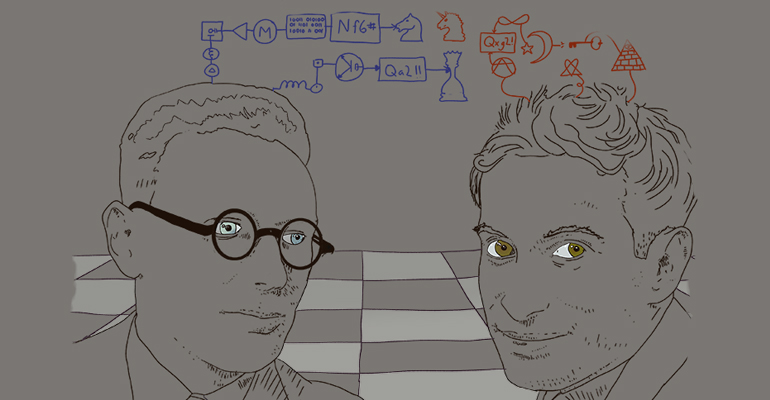The Chess Files
The answers are out there.
By Jim Eade
Is Chess Just a Game?
The answer is it depends. We must always begin by defining our terms. One might think we all know what we mean by the word game, but philosophers, beyond my realm of expertise, have differed on their definitions. Let’s choose one random example:
Computer game designer Chris Crawford, founder of The Journal of Computer Game Design, has attempted to define the term game using a series of dichotomies:
- Creative expression is art if made for its own beauty, and entertainment if made for money.
- A piece of entertainment is a plaything if it is interactive. Movies and books are cited as examples of non-interactive entertainment.
- If no goals are associated with a plaything, it is a toy. (Crawford notes that by his definition, (a) a toy can become a game element if the player makes up rules, and (b) The Sims and SimCity are toys, not games.) If it has goals, a plaything is a challenge.
- If a challenge has no “active agent against whom you compete”, it is a puzzle; if there is one, it is a conflict. (Crawford admits that this is a subjective test. Video games with noticeably algorithmic artificial intelligence can be played as puzzles; these include the patterns used to evade ghosts in Pac-Man.)
- Finally, if the player can only outperform the opponent, but not attack them to interfere with their performance, the conflict is a competition. (Competitions include racing and figure skating.) However, if attacks are allowed, then the conflict qualifies as a game.
We can safely assume that chess is a game, because it definitely involves attacks. Is it no more than a game? World Champion Botvinnik has been described as the most orthodox world champion. He approached chess in a scientific manner and trained himself to be physically fit and mentally prepared for matches. It is small wonder that his interest continued on with computer chess. The chess scientific approach is being pursued by chess engines running at ever greater speeds and plunging to ever greater depths to find the absolute truth in any given chess position.
It is not unsurprising that Botivinnik was defeated by Mikhail Tal in their first match. Tal knocked Botvinnik off balance by using a highly unorthodox style that inspired many, such as myself, to approach chess as a form of art. There is an aesthetic beauty to certain positions and certain moves that computers, no matter how advanced they become, may never be able to quantify. Botvinnik, not coincidentally, once remarked that Tal would be unstoppable, if only he learned how to program himself. Note the use of the word “program.”
Nowadays, it has become popular to think of chess as a sport. As a form of mental competition with a physical component. Try playing hours against a strong opponent, catch a quick bite to eat, and do it all over again. Fatigue becomes a factor. Any weekend warrior would confirm this. I used to tell non-chess players that it was like taking the SATs, and after a short break, taking them again.
So, is chess a science, art, sport or merely a game? I think it depends on the approach you take. When I was younger, I approached chess like a sport. My goal was victory, no matter how it was accomplished, within the rules, of course. As I have grown older, I remain more attracted to chess than ever, but as Art. I love surprising twists and turns and the discovery of unexpected resources. It is the “AHA” moment that I am after, when playing or merely observing.
If you play chess as a game, you can enjoy it as much as anyone. Especially, if you a find a friend or friends roughly your own playing strength. You can be transported to another universe, anytime, by simply setting up the pieces. You can spend as much time in that other universe as you possibly can, before inevitably coming back to this one.
You can also enjoy the scientific aspect and the joy of discovering hidden truths. You can demolish conventional wisdom on a regular basis, and no one can tell me that isn’t fun.
Whatever way you approach chess, it remains an educational tool for the young, a pleasant pastime in adulthood and a solace in old age. What a game!
You can send your chess questions and answers to me at jimeade@eadefoundation.org

